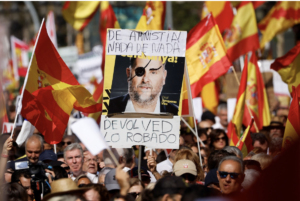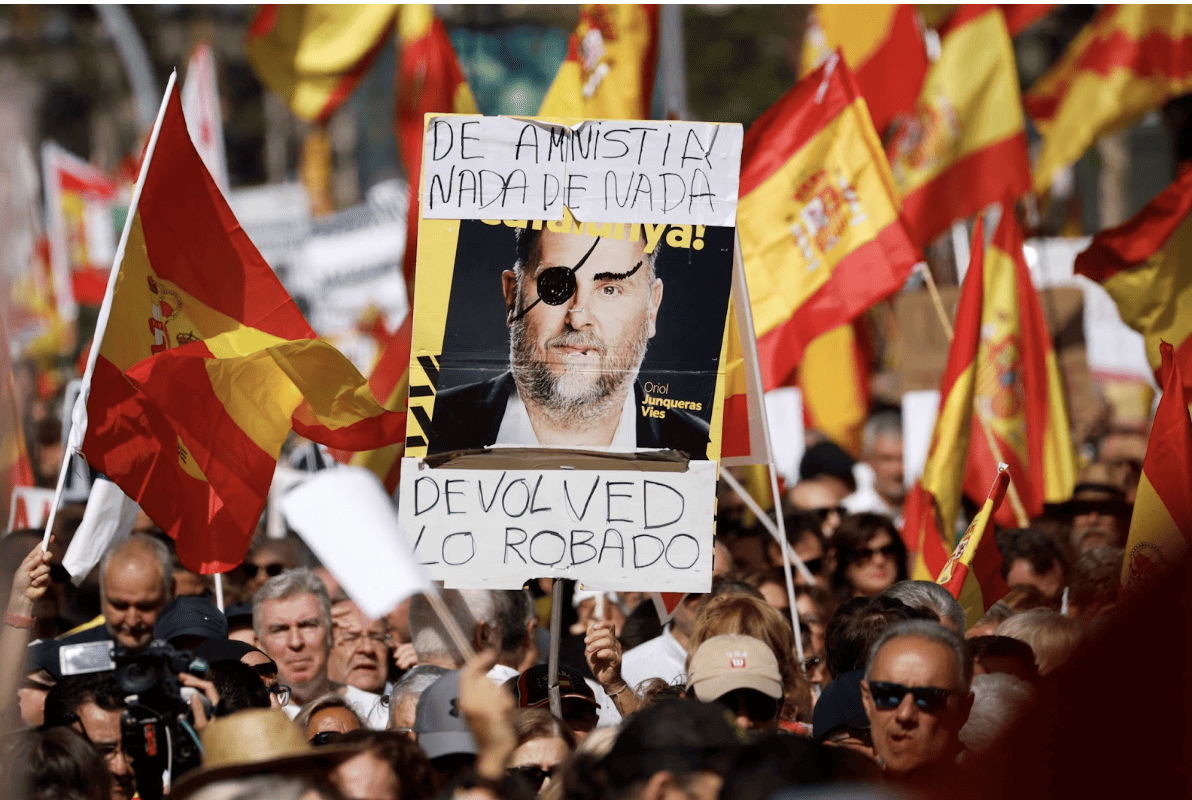
Albert Gea / Reuters
The streets of Madrid have been occupied by protestors since at least November 12 in response to the PSOE (Socialist Workers’ Party) agreement on an amnesty bid for Catalan separatists previously condemned by the Spanish judicial system. Negotiated to secure support from Catalan parties in Parliament, this amnesty is crucial for securing the second mandate of Prime Minister Pedro Sanchez, who is from PSOE. But while Sanchez and his supporters argue that the bill is necessary to maintain peace in Spain, his opponents and other groups reject it, fearing it may undermine the separation of powers by, for instance, subjecting judicial decisions to parliamentary review.
Gathering Support
In July, the conservative Popular Party won the national elections in Spain. The situation in the Spanish Parliament remained inconclusive, however, as the party failed to secure the required majority for its leader, Alberto Núñez Feijóo, to become the Prime Minister.
After months of negotiation with pro-independence Catalonian Parties – namely Junts (Together for Catalonia) and the ERC (Catalan Republican Left) – Sanchez managed to form a majority to guarantee another term in power. The Catalonian support, however, came at the expense of an amnesty law covering events related to Catalan separatism from 2012 to the present.
These events included a symbolic vote on independence organized by the Catalan government in November 2014 and a full independence referendum held in October 2017. Both referendums, however, were declared illegal by the Spanish State, and the Catalan declaration of independence was not recognized.
Who Benefits From the Bill?
According to news sources, the amnesty bill could benefit up to 400 people who have been convicted of a range of offenses, including embezzlement, disobedience, and sedition.
The most famous among them is Carles Puigdemont, the former head of the Catalonia regional government who fled to Belgium in 2017 to avoid being arrested for the illegal referendum. The bill may also lift the ban that prevents condemned separatists from holding public office. This would apply to Oriol Junqueras, who is the former leader of the ERC (Republican Left of Catalonia), another party advocating for Catalan independence.
Legal Security Threatened
Sanchez has justified the amnesty plan as necessary to heal the “wounds of the past” and guarantee peace in Spain. Nevertheless, concerns about the bill are not limited to the main opposition party, the conservative Popular Party. In a September poll conducted by Metroscopia, nearly 70 percent of Spaniards expressed their opposition to the agreement. PSOE voters constituted 59 percent of those opposed.
Groups such as the CEOE (Spanish Confederation of Business Organizations) fear it could compromise the system of checks and balances put in place. “The Committee has warned, as judges and other institutions have done, of the serious damage that these agreements can entail to the separation of powers and legal security, the foundation of our democracy, and of the fragmentation and institutional weakening that we are attending,” stated the CEOE.
At least four different groups of judges endorsed another communication letter opposing the bill. The magistrates asserted that the possibility of subjecting judicial procedures and decisions to parliamentary review, which could be included in the law, represented “a clear intrusion into judicial independence and a breach of the separation of powers.”
The EU Justice Commissioner also wrote to the Spanish government asking for details of the bill. The EU reasoned that this law has become “a matter of considerable importance in the public debate.”
Despite extensive mobilization against the amnesty bill, which faces opposition from more than two-thirds of the Spanish electorate, the government has not been prompted to reconsider it. Whether this legislation represents an initial step towards undermining the Spanish separation of powers and faith in democracy remains to be seen.
Other posts that may interest you:
- The Trouble with ‘Ecocide’
- Carbon dioxide removal – hit or miss?
- Local Victories for Turkish Opposition — A Sign of Hope?
- Are France and Japan a Mismatch Made in Heaven?
- A Reflection on Dark Tourism
Discover more from The Sundial Press
Subscribe to get the latest posts sent to your email.





